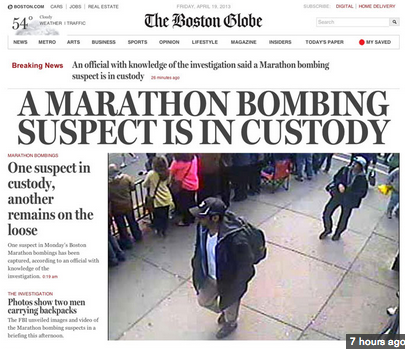By Jessica Petrocchi
What do you do when you find out your only source of information has just been telling you rumors instead of facts. A lot of false information was speculated through the media over these past few days.
“Obviously when you’re doing investigations especially of that magnitude,” Elon University’s Police Chief Dennis Franks said, “when you get leads you have to vet those leads to verify their accuracy. So that’s the hard part in being in investigations like that.”
The media claimed that a number of people died who, in reality, did not.
“We’re getting information that comes out,” Elon Professor David Copeland said, “We’re releasing it and it could be right it could be wrong. But the idea right now is speed being first so that’s what’s happening.”
Many claims were made about the Boston tragedy and were later found out to be untrue. With the necessity in our society about speedy journalism, the hard facts seem to be getting confused with rumors. But when presented as facts, this can hurt the media’s credibility on the topic.
Word went around online and on social media that arrest had already made arrests. This was false and created unwarranted hope among the people waiting for justice.
“It’s hard to know what is going on and what really happened especially with the false reports and claims that have been retracted,” Erin Delaney, a student from the Boston area said, “At first there were reports that they arrested someone, then people were saying they really didn’t. I have no idea what is really going on because the media is trying to report too quickly before they get the facts straight.”
And now they are looking for suspects, through their progress seems to be constantly at different points and levels throughout different channels.
The FBI criticized CNN and Fox News for inaccurate reports they made.
“I think they are doing the best they can right now,” Elon student Becca Rubin said, “They are just trying to keep the people updated and are correcting any errors they make.”
Now the media has been more careful after receiving public scolding. Recent reports seems to be vague and are called what they really are: speculation.
But the media coverage is not all a hindrance to finding suspects and coming to an accurate conclusion about what happened during the marathon.
“A perfect example of this is how the media has helped law enforcement. Once the FBI released those photos,” Chief Franks said, “they were on every news channel… Within less that 24 hours they’ve located 2 suspects and are still trying to apprehend the one.”
“I think that accuracy is important,” Copeland said, “I think letting people know that things are happening is important. And releasing names and things like that without confirmation, without knowing for sure it’s accurate is problematic.”

